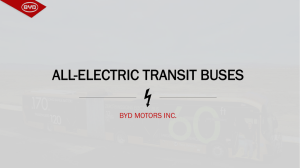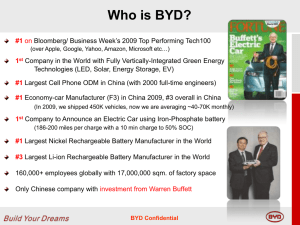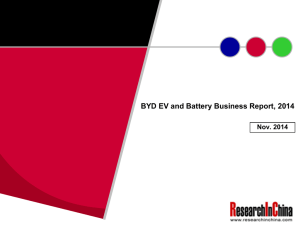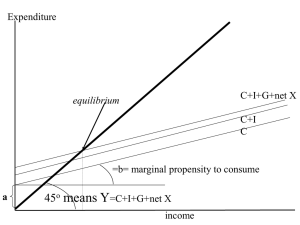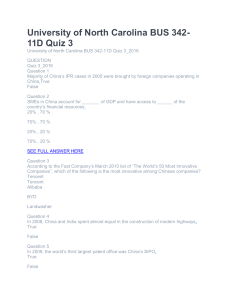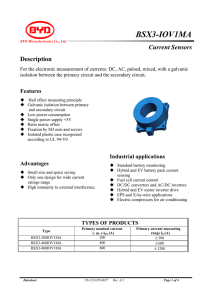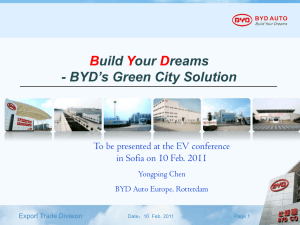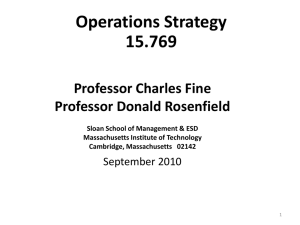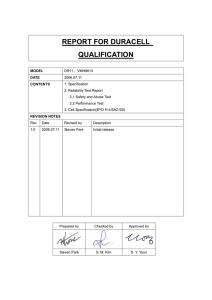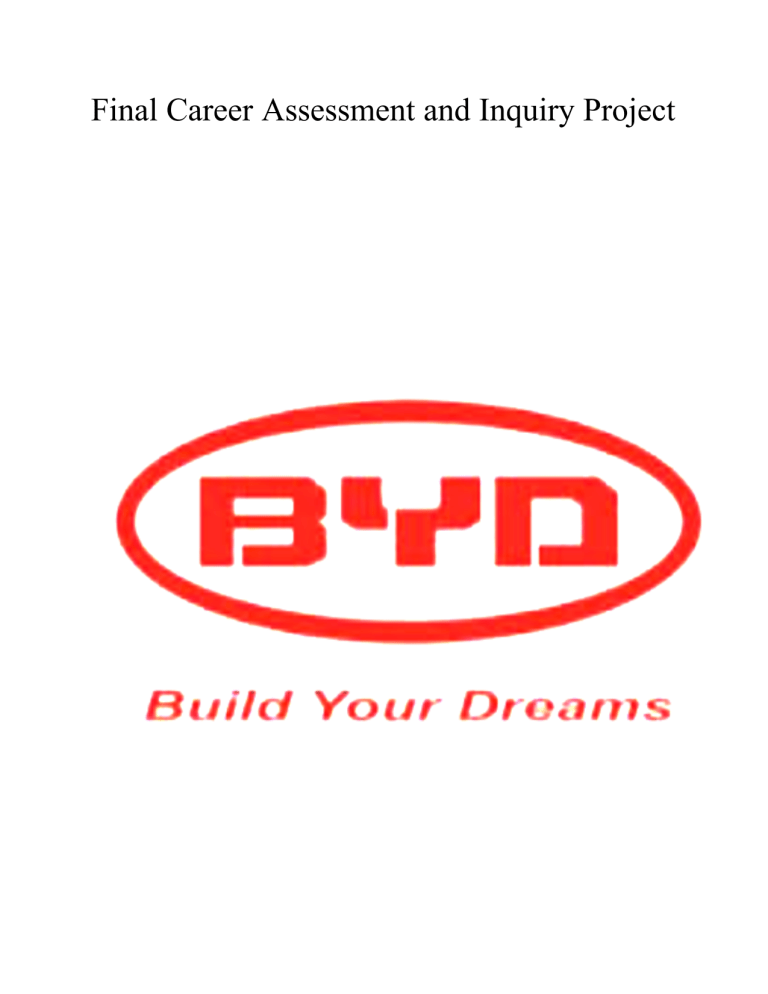
Final Career Assessment and Inquiry Project BYD Company BYD Co Ltd is a Chinese manufacturer of battery-powered bicycles, buses, forklifts, solar panels, rechargeable batteries, trucks, and automobiles with the goal of creating technological innovations for a better life. It’s within the industry of consumer durables and currently has 229,000 employees. The BYD Company was founded in February 1995 with 2.5 million RMB($380,112.50 USD) and 20 employees. In 2000 the company became the first Chinese lithium-ion battery supplier and received orders from companies such as Nokia and Motorola. In September of 2005, the company emerged in a new market of automobiles with its first compact car, the BYD F3 which has evolved to become one of the top-selling compact cars in China. The company next gained more international attention when Warren Buffet’s flagship investment company Berkshire Hathaway acquired 225 Million H-shares of BYD’s stock at $8.00 a share. The true future of BYD’s automobile market began in 2008 when the hybrid F3DM was released. Then, ten years later in 2018 when the E6, BYD’s first fully electric compact car was released to the market. This release instigated a significant amount of competition for the market in China between companies such as SAIC, FAW, Dongfeng, Chana, BAIC, GAC, Chery, Geely, and Tesla. Additionally, due to the immense amount of pollution within China and the stress that has been placed to try to reduce it, renewable, clean products such as BYD’s and its competitor automobiles hold the future of the market. BYD’s headquarters is located in Shenzhen and is split between two different subsidiaries: BYD Automobiles and BYD Electronics. Currently, on November 28th, BYD’s stock sits at $48.77. In the past three years, BYD’s revenue has amounted to 138,086 Million HKD(2019), 144,256 Million HKD(2018), and 185,365 Million HKD(2017) between both subsidiaries. The company has now established over 30 industrial parks worldwide in countries such as India, Slovakia, Paris, and the U.S. BYD has many competitors due to the diversity of the services and goods it offers. The company’s biggest facets are the electric automobile industry, electric bus industry, and the lithium-ion battery industry. Because of this, BYD also has many offices and service centers in Japan, South Korea, Malaysia, the United States, the Netherlands, England, Australia, as well as several others throughout South America. Distribution can be very tricky for companies selling automobiles like BYD due to the size, accessibility and cost of transporting their goods. Without the wide array of distribution that BYD has grown to utilize, the company would be in a very different position today. One of BYD’s preliminary goods that drove their sales in the early 2000s was their lithium-ion batteries. These batteries became a monopoly in the market due to the quality and price of production that BYD offered. The company was able to facilitate business-to-business (B2B) distribution between companies such as Nokia and Motorola to make millions. The company uses many different modes of distribution. Their online store serves as direct distribution straight to the consumer. BYD also participates in several exclusive distribution strategies through dealerships selling their trucks, automobiles and forklifts but also through different collaborations. Currently only in China, BYD compact cars can be found at selective Toyota dealerships. This deal with Toyota allows consumers who know little about EV cars to see and try BYD cars. This is not only exclusive distribution but also helps expose the BYD brand and products to new customers. In the automobile subsidiary, BYD controls the logistics of the supply chain, from planning the manufacturing of the cars and trucks to eventually selling them at dealerships. Whereas the electronic subsidiary manages only the first three steps of the supply chain ending as wholesalers selling their batteries in bulk to other companies. By controlling all parts of their supply chain in most circumstances, BYD manages a corporate distribution system where it takes all of the risk but also all of the reward whereas some companies like Tesla buy their batteries from others. Meaning, if the company has a problem in the product development or manufacturing they will have to claim responsibility and the consequences that come with that mistake. However on the other hand, if they make a very successful product and it sells out quickly they can then manufacture more of these products or even mark up the price to create more profit. Despite several of China’s strict laws and restrictions business must attend too, marketing in China is booming. China became the world’s largest e-commerce market when its total online sales only reached USD 409 billion in 2013. In 2018 China's online retail sales was USD 1.33 trillion and at this rate of growth, China’s total online retail sales are expected to hit USD 2.4 trillion by 2020. BYD’s online sales alone have now amounted to 58% of the $17.6 billion of total sales they hit in the past year. BYD has gained attention to produce such online sales by creating several commercials mostly for their cars. These commercials inform the public to reserve their own car online which they can then test drive and buy if decide that they like the car. This strategy of reserving a car makes customers immediately feel attached. This feeling of ownership incentivizes the customer to buy the car because they believe it is in-part already theirs and want to keep it out of others’ hands. Here BYD’s marketing team has succeeded in using the concept of a customer’s orientation to find ways to make consumers more interested in trying out their products. However, this is only the first step. Once the customers arrive to test drive their car, it becomes the sales team’s responsibility to keep a service orientation and help the customer with whatever they may need. Currently, BYD has a huge focus on expanding their products overseas to take over international electric car markets. They are achieving this goal through promotion. BYD has invested sizeable amounts of funds in order to expose their brand to more people all over the globe. In 2018 BYD became the official sponsor for Arsenal, a very well known professional football team in England. The company received pitch-side LED signage, a statement posted by Arsenal saying “the world’s best-selling electric vehicle manufacturer”, and branding on the seats at the Stadium for several million people to see. This is a great move by BYD to reach its current target market of suburban English folk who have the money and interest to buy an electric vehicle. BYD has also used A class celebrities such as Leonardo DiCaprio in campaigns of commercials to reach markets such as the United States and various other European countries. As I am currently in High School, I am unsure of what job or major in the future I hope to pursue. This project has surely given me ideas of interesting major options in business I one day might accomplish. Inside the distribution concentration of business, I haven’t been able to find too many jobs that fit my current interests. Personally, I don’t find logistics or transportation very interesting. In the marketing matrix, I found jobs that sparked my interest such as a Marketing Manager, Marketing Specialist, Marketing Coordinator or a Marketing Campaign Strategist. As a Manager I would lead marketing strategy initiatives, execute campaigns and analyze business opportunities and make $60k+ depending on the size of the company. I definitely believe I could succeed in this role however I think I would more enjoy being a Marketing Specialist where I would help in the development and execution of marketing plans to reach targets from brand awareness to consumer behavior trends. I have increasingly found the psychological aspect of the business industry fascinating, especially in examining consumers behavioral patterns and how to attract their attention. Heading into college next fall, I know I want to major In business but haven’t had a concrete idea of what to specialize in. Throughout the process of piecing this project together, I investigated many tangents in curiosity of what I may enjoy studying in the future. I was very surprised to find how much I learned about my interests and I now know I’d like to explore marketing classes in college. If it’s destined that I become a Marketing major, this project will have been the first domino leading me down that path. Works Cited Journal, Wall Street. “BYDDF | BYD Co. Ltd. Annual Income Statement - WSJ.” The Wall Street Journal, Dow Jones & Company, www.wsj.com/market-data/quotes/BYDDF/financials/annual/income-statement. “About BYD.” BYD, www.byd.com/en/CompanyIntro.html. Roberthickling. “BYD USA · Build Your Dreams · International Manufacturer of Electric Cars, Trucks, Buses, Forklifts, Monorail, and Battery Systems.” BYD USA, BYD USA, 16 Sept. 2019, en.byd.com/. “BYD.” Forbes, Forbes Magazine, www.forbes.com/companies/byd/?sh=7d1052e53526. Nicholson, Paul. “Plug Pulled on Arsenal's BYD Deal after Sponsor Intermediary Turns out to Be a Fraud.” Inside World Football, Inside World Football, 17 July 2018, www.insideworldfootball.com/2018/07/17/plug-pulled-arsenals-byd-deal-sponsor-intermediary-t urns-fraud/.
